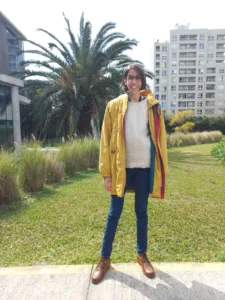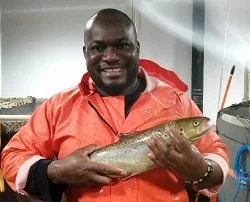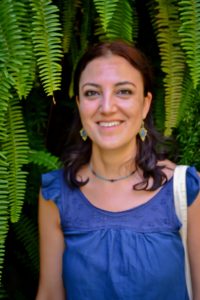Two annual awards of €2,000 will highlight the achievements of under-represented early-career researchers (ECRs) who have faced difficult circumstances while conducting their work. Applicable difficult circumstances may be but are not limited to disabilities, social/cultural/political persecution, refugee status, single parenting or other caring responsibilities that have created unequal opportunities. This year’s awardees will also be invited to speak at the ESEB Congress in Barcelona, Spain.
Call for Applications
Next deadline: to be announced
Eligibility
- The award is open to PhD students, postdoctoral scientists or non-tenure-track research fellows who do not hold a permanent academic position and have achieved their research while facing difficult circumstances. Note that researchers based in any country are eligible, irrespective of GDP status, and not just in Europe.
- Applications may be submitted by the person benefiting from the grant, or by a colleague/supervisor when a letter is included from the nominee approving their nomination.
- The person submitting the application must be an ESEB member, or become a member immediately after receiving the award (to become a member of ESEB, please visit our membership page).
- Applicants who have previously received this award are not eligible.
- The award stipend (2000 €) can be spent at the discretion of the nominee. Nominees will be required to write a short summary of their achievement to be highlighted on the ESEB Equal Opportunities website and ESEB newsletter.
- ESEB understands that some applicants are concerned about personal and professional risks of exposure. In such cases, the EO board will work with the recipient of the award to increase visibility of underrepresented backgrounds in Evolutionary Biology while also protecting the individual’s safety.
Application procedure
Applications should be sent as a single PDF file to Ute Friedrich at the ESEB office, office@eseb.org, with the subject line: 2025 EUEA award.
It should include
- A cover letter with the nominee’s name, current status and institution, PhD start date, duration and reason for any career breaks, and a signed statement on what the nominee has achieved and why it is considered the nominee achieved it under difficult circumstances. The difficult circumstances are primarily, but not solely, disabilities, social/cultural/political discrimination, refugee status, single parenting or other caring responsibilities. The letter should not exceed 2 pages.
- A short CV of the nominee (1–2 pages)
- Proof of the nominee’s achievement: this can be for instance a PhD diploma, a publication, or an outreach initiative.
- A letter of support from the nominee’s host institution or a colleague.
Applications should arrive no later than Friday, 31 January 2025. Please take care to limit the size of attachments (total < 10 MB) in any one email.
Applications will be evaluated by the Equal Opportunity Committee chaired by Anne Charmantier, and awardees will be informed around the end of February. The award recipients are encouraged to attend the next ESEB congress in Barcelona, Spain (August 17–22, 2025), where they will be invited to speak about their work and/or equal representation in the field of evolution. In cases where professional exposure poses risks to an awardee’s safety and well-being, the EO committee will collaborate with the award recipient to identify alternative actions that promote visibility for underrepresented groups while ensuring their protection. ESEB will contribute to the travel expenses and registration fees.
Winners in 2025

Dr. Danielle H. Drabeck, University of Minnesota, United States – I am an evolutionary biologist specializing in vertebrate evolution, with a particular focus on the genetic, historical, and biophysical bases of repeated and coevolutionary adaptations. My research has explored venom resistance in mammals, metabolic adaptations in hibernators, and the evolution of sensory systems in cave-dwelling fishes. My current work focuses on utilizing genomic data across vertebrates to understand the genetic basis of convergent “extreme” adaptations that allow organisms to adjust to extraordinarily difficult environmental and biotic challenges. I am tremendously grateful and honored to be selected for this award, and am excited to use this opportunity to inspire young scientists with similar limitations to pursue this field and contribute to a more inclusive future. Navigating academia as a single parent with multiple physical disabilities, I have encountered significant barriers that have shaped my path as both a researcher and an advocate for equity in STEM. My education has been speckled with bouts of flare-ups from multiple severe autoimmune diseases, leading to periods of hospitalization, complete disfunction, and tremendous emotional and financial strain. My role as a single parent has had me turn down many invitations to speak at conferences, take positions out of state, or doing field and/or lab work that require long hours (outside of childcare hours). Despite these challenges, I have secured competitive research funding, published extensively, and actively contributed to fostering inclusion in scientific communities. My work has been recognized through numerous grants and fellowships, including an NIH IRACDA fellowship and an NSF Access for Persons with Disabilities award. I remain dedicated to advancing knowledge in my field while advocating for structural changes that support broader participation in evolutionary biology.
Read Danielle’s full biography
I am an evolutionary biologist specializing in vertebrate evolution, with a focus on understanding the genetic, historical, and biophysical underpinnings of repeated and coevolutionary adaptations. My research integrates comparative genomics, molecular evolution, and physiological analyses to investigate how vertebrate lineages evolve in response to environmental pressures. My work has spanned multiple biological systems, including venom resistance in mammals, metabolic adaptations in hibernators, and sensory system evolution in cave-dwelling fishes. My current work focuses on utilizing genomic data across vertebrates to understand the genetic basis of convergent “extreme” adaptations that allow organisms to adjust to extraordinarily difficult environmental and biotic challenges.
I earned my PhD from the University of Minnesota, where my dissertation focused on the molecular and functional characterization of venom resistance in marsupials. During the last year of my PhD, I also became a parent in a country where I had only six weeks of maternity leave and extremely limited daycare options as a graduate student. Despite these challenges, I was awarded over 22 grants and fellowships, including an institutional Grant-in-Aid (similar to a one-year full R01 proposal). My dissertation work resulted in five publications in top-tier journals (and two additional publications from my previous work as a master’s student at Tulane University). As a graduate student, I was an invited speaker at more than six international conferences and inter-institutional seminar series and presented contributed talks at many more. I also taught several courses as a graduate teaching assistant, served as a curatorial assistant for the Bell Museum of Natural History, mentored several undergraduate researchers, and designed and implemented several science outreach events to communicate my research to the public. I was an active member of my community and helped dismantle several discriminatory policies that were in place when I was a graduate student.
I started my postdoctoral fellowship in 2019 (I applied to and was awarded an NIH IRACDA training fellowship) to work with Suzanne McGaugh in the same department (different lab) at UMN. Shortly before this position began, I had a major health event that landed me in the hospital and incapacitated me for several months. A few months into my postdoctoral research, the pandemic began, I was pregnant with my second child, and shortly thereafter became a single parent. With the tremendous support of my postdoctoral advisor and the IRACDA fellowship coordinators, I was able to continue work on my postdoctoral research (2019–2025). During that time, I suffered several relapses with my disability and also struggled to get resources for my firstborn child, who has special needs. My academic career has been tremendously impacted by the combination of my circumstances: energy limitation, limited ability to do lab/fieldwork, geographical restriction for future academic jobs, being a full-time single parent to two small children, etc.
Despite these challenges, I have published/submitted five publications in top-tier journals during my postdoctoral career, secured a National Science Foundation Access for Persons with Disabilities Award, which currently funds my work, as well as a competitive NIH LRP award. Though my ability to travel was severely limited, I have presented my work as an invited speaker at a recent Gordon Conference, Evolution (Montreal), and several other international (virtual) conferences and seminars (with the help of new diversity initiatives that provided funding for childcare at conferences and travel awards). I have also taught at two local community colleges and am currently teaching the Evolution 3409 course at UMN. In my teaching and mentoring roles, I have made significant contributions to equity and inclusion in both curriculum and policy and was recently featured in an upcoming TREE Cell Press series about scientists with disabilities (DOI 10.1016/j.tree.2024.12.009).
As a woman, a single mother, and a person with a disability, I have become acutely aware of the systems in place within academic science that funnel out diversity. I embody intersectional identities that have been previously excluded from science. Although the axes of inequity I have faced have been significant, they have importantly opened my eyes to the privilege that has also served me, as well as my responsibility in dismantling the systems and policies that uphold it. Broadening the diversity of STEM is central to my approach to teaching and mentoring, and it shapes the way I think about science.
Sophia Siome, Netherlands – This year, International Transgender Day of Visibility (March 31, 2025) quietly passed as just another Monday, not acknowledged by my institution or any of my colleagues. I, myself, kept quiet and did little more than the day’s work preparing for a public presentation later that week, thinking it was better not to draw attention to the day or my connection to it. This urge to shrink and hide—to not be visible seems to be a growing sentiment within parts of the transgender community over the past few years. With trans people being murdered at increasingly higher rates[1] and trans identities continuing to be politicised [2], it should come as no surprise that, for many, the notion of visibility rings hollow.
[1] https://transrespect.org/en/trans-murder-monitoring-2024/
[2] https://www.erininthemorning.com/p/anti-trans-national-risk-assessment
I am a transgender academic, and my mere existence has been lauded by friends and colleagues as an act of resistance. It is, but it shouldn’t be. Being an academic is challenging in its own right. Being transgender in academia means tackling those challenges while often having to navigate byzantine medical and legal processes, adjust to rapid shifts in social environment, and face a barrage of harmful attitudes and actions against the transgender community. I am fortunate to have progressed far enough to become a young academic, unlike many trans people who are pushed out of the education system (and wider society) at all steps of the way, especially in the Global South. I owe much of that progress to prioritising my safety—by hiding my identity—during my time in higher education and academia, which is a privilege that many trans people do not have. However, I hope for a time when trans people do not have to choose between being visible and being safe.
Read Sophia’s full biography
This year, International Transgender Day of Visibility (March 31, 2025) quietly passed as just another Monday, not acknowledged by my institution or any of my colleagues. I, myself, kept quiet and did little more than the day’s work preparing for a public presentation later that week, thinking it was better not to draw attention to the day or my connection to it. This urge to shrink and hide—to not be visible seems to be a growing sentiment within parts of the transgender community over the past few years. With trans people being murdered at increasingly higher rates[1] and trans identities continuing to be politicised [2], it should come as no surprise that, for many, the notion of visibility rings hollow.
I am a transgender academic, and my mere existence has been lauded by friends and colleagues as an act of resistance. It is, but it shouldn’t be. Being an academic is challenging in its own right. Being transgender in academia means tackling those challenges while often having to navigate byzantine medical and legal processes, adjust to rapid shifts in social environment, and face a barrage of harmful attitudes and actions against the transgender community. I am fortunate to have progressed far enough to become a young academic, unlike many trans people who are pushed out of the education system (and wider society) at all steps of the way, especially in the Global South. I owe much of that progress to prioritising my safety—by hiding my identity—during my time in higher education and academia, which is a privilege that many trans people do not have. However, I hope for a time when trans people do not have to choose between being visible and being safe.
While the prevailing circumstances that I and other trans academics find ourselves in serve only to undermine our wellbeing and career, the academic community can contribute to changing this. It is not enough to passively accept us. Much like the EO committee of ESEB has acknowledged the difficulty of my situation as an under-represented early-career- researcher, acknowledging and rewarding the work and achievements of transgender academics is crucial for us to succeed under these circumstances.
Furthermore, providing support and space for trans colleagues will help to ensure trans people remain in academia and contribute to us being (or feeling) safe enough to be visible.
[1] https://www.erininthemorning.com/p/anti-trans-national-risk-assessment
[2] https://transrespect.org/en/trans-murder-monitoring-2024/
Runners-up in 2025
May Shehady – I am a first-year PhD candidate researching host-parasite interactions in freshwater ecosystems, focusing on Daphnia. Coming from a background that is both underrepresented and often politically constrained, it’s not always possible for me to share my identity or story openly. Outside of academia, I’m also involved in theatre and art, which are important parts of my life. Being recognized by the EUEA prize is an encouraging reminder that there is space for researchers like me in this field. I’m grateful for communities that value inclusion and quiet resilience as much as academic achievement.
Adithya Sarma, Netherlands – I am about to defend my PhD in the field of neurosciences at the University of Groningen, where I study how social interactions influence sleep and the consolidation of social memories using mice and fruit flies. I was diagnosed with acute leukemia during my Master’s in Groningen, and the treatment spanning several years continued well into my PhD. When my student insurance withdrew from paying mid-treatment, the financial burden fell heavily on my family and me, forcing us into long-term debt to cover life-saving care. Despite these challenges, I completed my research on time, published my work, and my particular case helped kickstart much-needed policy changes to improve insurance protections for international students with serious illnesses. I am honored to be recognized as a runner-up for the EuEA award, and grateful for the opportunity to contribute to a more inclusive and compassionate academic community.
Previous winners
Affiliations listed at the time of the award.
2024
Sofía Barbero, Universidad de Buenos Aires, Argentina

I am a mammalogist, specialized in sigmodontines, a lineage of cricetid rodents native to South America. My research has focused on analyzing the relationship between craniomandibular morphology and diet, and how these factors interplay with environmental variables in assemblage structuring and species composition changes over time. I am currently working on recent extinctions of small mammals from the southern hemisphere.
I obtained my PhD in Biological Sciences at the Faculty of Exact and Natural Sciences, Universidad de Buenos Aires, with a research project carried out at the Museo Argentino de Ciencias Naturales “Bernardino Rivadavia”, and a grant from the Argentine National Council on Scientific and Technical Research (CONICET). My project had the aim of making an ecomorphological characterization of five sigmodontine assemblages, comprising 22 species from central-eastern Argentina. It involved taking craniomandibular measurements on over 900 specimens, and performing a meta-analysis of all the available dietary data. I assessed the relationship between craniomandibular morphology and diet, finding particular craniomandibular traits linked to different dietary strategies, and variations in this relationship between assemblages. I then incorporated environmental variables into my analyses, and studied how they influenced niche structuring at different locations. Additionally, I investigated the composition changes in an assemblage between the late Holocene and the present time, which revealed that some combinations of craniomandibular morphology and diet strategies seemed to be related to local extinctions.
I am currently working on a postdoc at the Laboratory of Integrative Biology of Evolutionary Systems, Faculty of Exact and Natural Sciences, Universidad de Buenos Aires. I am studying recent extinctions of small mammals from the southern hemisphere, with the aim of identifying trends that could link extinction vulnerability to biological variables of the species.
Midway through my PhD, I began experiencing an array of disabling symptoms, including severe joint pain, constant headaches, blurry vision, chronic abdominal pain, and overall exhaustion. This, in turn, significantly impacted my cognitive abilities, difficulting my work. My research became intertwined with countless medical appointments that were unable to provide any answers. In spite of being undiagnosed, untreated and constantly declining in health throughout the last years of my doctorate, I was able to fulfill all my objectives and finish my thesis.
During my first year of postdoc I was diagnosed with three disabling chronic health conditions: hypermobile Ehlers-Danlos syndrome, dysautonomia (POTS) and stage IV endometriosis. After undergoing a major surgery, starting pharmacological treatments and physical rehabilitation programs, I am slowly getting better and regaining physical and cognitive abilities. Nevertheless, I am now facing a new difficulty, as my country is entering a state of deep economic and political crisis that is threatening the continuation of the national research institute (CONICET), where most of Argentina’s scientists work. I am proud to have remained committed to research through several years with undiagnosed chronic health conditions, and to have been recognized with the ESEB under-represented early-career researcher achievement award. I am determined to keep doing my best to face adversity and contribute to the advancement of knowledge in my field of study.
Harihar Jaishree Subrahmaniam, Aarhus University, Denmark

I am honored to be recognized as a recipient of the 2024 ESEB Under-represented ECR Achievement Award, a testament to my journey in plant evolutionary ecology marked by resilience and determination observed also in the very plants I study.
From the lush gardens of my grandmother’s home in India to navigating academia’s uncharted territories, my path has been one of overcoming adversity and honing resilience. Amidst the challenges of isolation and discrimination during my Ph.D. studies abroad, my research on plant communication provided solace and purpose. This journey inspired the creation of Paksh, a mental health support network, and fueled my advocacy for systemic change within the scientific community.
Currently, my focus lies in decoding the intricate chemical conversations of plants to pioneer sustainable agricultural solutions. As Chair of the science policy working group at the Marie Curie Alumni Association and advisor for Open Research Europe, I am also dedicated to fostering inclusivity and equity in academia. My story stems from a relentless commitment to leaving a lasting impact in the scientific realm, understanding the amazing world of plants, and advocating for what we can learn from them. I am grateful for this recognition and excited to continue my journey of discovery and advocacy.
2023
Paul Bangura, Helsinki University, FI

Improved productivity in farmed fish involves a long process of domestication, producing a phenotype very different from the wild-type phenotype. While many of these changes may arise due to intentional selection of traits beneficial for captive rearing, such selection can also have negative consequences due to trade-offs with other correlated traits that may be unintentionally selected simultaneously but have a negative influence on productivity. For example, aggressive behaviour has a negative influence on productivity but may be unintentionally co-selected. A second trade-off example is fast growth (positive for aquaculture) and early sexual maturation (negative for aquaculture as growth and flesh quality decrease). The positive correlation between these two traits is generally advantageous in wild populations but should optimally be de-coupled for improved aquaculture productivity. However, detailed studies simultaneously linking the propensity of sexual maturation with behaviours such as aggression, and the possible common genetic basis of these aquaculturally important phenotypes is yet to be conducted. This is now possible thanks to recent work of Craig Primmer’s EVOLUTION, CONSERVATION, AND GENOMICS research group, University of Helsinki for characterising the relatively simple genetic basis of age at maturity in Atlantic salmon, thus allowing use of genetic prediction to characterise the likely age of later sexual maturation already at the juvenile stage (based on the genotype of the vgll3 and six6 genes).
I am a 3rd year PhD candidate in the Interdisciplinary Environmental Science doctoral programme, University of Helsinki. My research is investigating how the age of sexual maturation is related to other important characteristics of fish, from both evolutionary and aquacultural perspectives. Therefore, the objective of my PhD project is to use salmon as a model to elucidate the relationship between behaviour at the juvenile stage, and sexual maturation later in life, which is poorly understood, but critical information critical for the aquaculture industry and hence promotes sustainable aquaculture and food security. I am from a food insecure country (Sierra Leone) and fish remains the main source of animal protein (85%) but depends largely on wild caught fish to satisfy this need, resulting in overfishing. The motivation for my PhD is to gain knowledge in this sector and help the region in alleviating hunger and malnutrition while protecting the environment and its resources. However, getting to this point has been a difficult journey. Growing up in rural Sierra Leone, achieving an education was fraught with challenges. I attended school barefooted and without meal for the first six years of schooling as this was a luxury I couldn’t afford. During the civil war in Sierra Leone, I was taken captive by the rebels deep into the northern jungle where I was trained as a child combatant. I fought alongside the rebels for about a year before escaping to Freetown. To go back to school, I begged on the streets of Freetown and did different types of odd jobs to raise my school fees. Despite all, I persevered, and I am honoured to now be recognized by the ESEB Under-represented ECR award.
Zabibu Kabalika, University of Glasgow, UK

Ms. Zabibu Kabalika is a young conservation biologist from Tanzania, East Africa. Her research interests lie in the areas of conservation of migratory animals, human-wildlife interactions and the resilience of ecological processes to long-term changes. She is currently in the final stages of her PhD studies at the University of Glasgow, focusing on the application of isotopic methods to understand movement patterns and niche differentiation between migratory ungulates across the Serengeti-Mara ecosystem in Tanzania.
Zabibu graduated from Sokoine University of Agriculture (SUA) in 2014 with a bachelor’s degree in Wildlife Management. In 2016 she was awarded the highly competitive Karimjee Jivanjee Conservation Scholarship (2016–2018) to attend the international MSc program in Conservation Management of African Ecosystems (CMAE) at the University of Glasgow. During her MSc, she developed a novel approach for geolocating migratory animals across the greater Serengeti ecosystem using sulphur isotopes in tail hairs, which is published in the journal Movement Ecology (https://doi.org/10.1186/s40462-020–00222‑w).
In 2019 Zabibu was awarded the United Kingdom’s prestigious Commonwealth PhD Scholarship (with an additional £35,000 research grant, which is rarely offered) to continue her graduate studies in evolutionary ecology at the University of Glasgow. Her research investigates the use of isotopic methods to understand the evolution of niche differentiation and alternative life history strategies. For example, Zabibu has developed forensic techniques to differentiate resident versus migrant life history strategies using the isotopic signatures found in continuously growing tail hair from both live and dead animals. Her research has also demonstrated periods of dietary overlap in species that migrate together to understand how competition for food may have structured these ungulate communities and their seasonal movements.
As an early career researcher, Zabibu is eager to build her research career in wildlife conservation and she is interested to explore the evolution of life histories of migratory populations more generally. She is currently seeking opportunities to further her knowledge, skills and experience in wildlife conservation research as well as opportunities to form international collaborations. Zabibu’s ultimate goal is to build her research career in her home country, Tanzania.
2022
Kelley Leung, University of Groningen, NL

Polyploidization is detrimental to the individual because of problems of sterility, gigantism, and gene expression. And yet, polyploidy is now recognized as a major evolutionary driver in the ancestry of most Eukaryota, associated with gene network diversification, mass speciation, and higher adaptability. How initial disadvantage and downstream advantage are bridged has been difficult to study in animals because of inviability. In my PhD with Leo W. Beukeboom of the University of Groningen, I exploited multiple pathways of heritable polyploidization in the parasitoid wasp Nasonia vitripennis to develop it into an animal polyploid model. I am honored to now be recognized by the ESEB Under-represented ECR award. I come from Chicago gang territory and a low-income family. I went through a divorce halfway through my PhD. In the final stages, I became unexpectedly pregnant with twins with someone who abandoned them before they were born. But I was able to publish papers, write successful grants, and defend my PhD throughout. I am now raising my beautiful children as a single mother and am a postdoc at the University of Groningen, continuing my work in polyploid evolution as well as biological control and host specificity. I thank my childhood teachers, family and friends, childcare providers, colleagues, and advisors for helping me prove that community is what keeps determined women in the sciences. I hope to live up to being a recipient of this award by increasing the visibility of and creating opportunities for students and scientists from disadvantaged backgrounds.
Öncü Maraci, University of Bielefeld, DE

The gastrointestinal tracks of the animals are home to diverse and dynamic microbial communities, collectively known as gut microbiota. The discoveries in the last two decades have left no doubt that gut microbiota has mutual connections with several aspects of host physiology, fundamentally altering our understanding of animal biology. Today it is well-established that microbial symbionts are functionally involved in countless processes and adaptations of their hosts. Nevertheless, we still lack a proper understanding of the factors shaping the gut microbiota, particularly in birds. I am a postdoctoral researcher in the group of Prof. Barbara Caspers at Bielefeld University, the Department of Behavioural Ecology, which has become a refuge to me since 2016. I received a postdoctoral fellowship from the Philipp Schwartz Initiative of the Alexander von Humboldt Foundation, which enabled me to study fascinating interactions between animals and their microbial symbionts. In a broad sense, I aim to understand the causes and consequences of individual-specific microbiomes. In particular, I studied the relative impacts of host selection and social transmission on gut microbiota across different developmental stages in zebra finches. Furthermore, in a collaborative project with Marta Szulkin from the University of Warsaw, I also investigated the impact of urbanisation on the gut microbiota of great tits. My research demonstrated that host-specific factors and environmental modifications collectively shape animal-associated microbial communities leading to tremendous individual variations. As a next step, I aim to understand how individual variation in microbial communities translates into cognitive and behavioural differences.
